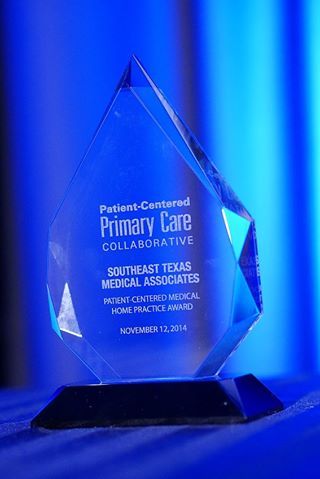|
PC-PCC Awards SETMA the first PC-MH Practice Award
On November 13, 2014, In Washington, DC, the PC-PCC presented SETMAwith the first Patient-Centered Medical Home Practice Award. In the words of PC-PCC, the award honors SETMA’s exceptional dedication to achieving IHI’s Triple Aim and their focus on integrating state-of-the-art health information technology across their sites as a means to transform care delivery. The ward presentation stated that SETMA is the only PCMH practice in the country that has been accredited by all four major national certifying organizations (NCQA, AAACH, URAC and The Joint Commission) and PC-PCC is thrilled to recognize SETMA’s accomplishments.

SETMA began the pilgrimage to becoming a medical home before ever hearing the term or concept. In May, 1999, SETMA defined ten principles of a 21st Century medical practice and of designing an excellent electronic medical record system. They are:
- Pursue Electronic Patient Management rather than Electronic Patient Records.
- Bring to bear upon every patient encounter what is known rather than what a particular provider knows.
- Make it easier to do a task right than not to do it at all.
- Continually challenge providers to improve their performance.
- Infuse new knowledge and decision-making tools throughout an organization instantly.
- Establish and promote continuity of care with patient education, information and plans of care.
- Enlist patients as partners and collaborators in their own health improvement.
- Evaluate the care of patients and populations of patients longitudinally.
- Audit provider performance based on the Consortium for Physician Performance Improvement Data Sets.
- Create multiple disease-management tools which are integrated in an intuitive and interchangeable fashion giving patients the benefit of expert knowledge about specific conditions while they get the benefit of a global approach to their total health.
All six of SETMA’s locations are accredited as medical homes and all of SETMA’s staff and healthcare providers continually work toward advancing the patient-centered nature of our practice and principles. We are proud of this award and will work hard to continue to be worthy of it. A link to Dr. Holly’s address given in acceptance of this award can be found on his Face Book page and on SETMA’s website.
What is PC-PCC?
The self-description of PC-PCC, which appears on its website gives the following details about the organization. Founded in 2006, the Patient-Centered Primary Care Collaborative (PCPCC) is dedicated to advancing an effective and efficient health system built on a strong foundation of primary care and the patient-centered medical home (PCMH). The PCPCC achieves its mission through the work of our five Stakeholder Centers, led by experts and thought leaders who are dedicated to transforming the U.S. health care system through delivery reform, payment reform, patient engagement, and employee benefit redesign. Today, PCPCC’s membership represents more than 1,200 medical home stakeholders and supporters throughout the U.S.
To achieve our mission, we work in partnership with our members, partners, and fellow medical home advocates to:
- Disseminate results and outcomes from medical home initiatives and clearly communicate their impact on patient experience, quality of care, population health and health care costs.
- Advocate for public policy that advances and builds support for primary care and the medical home, including payment reform, patient engagement, and employer benefit initiatives.
- Convene health care experts, thought leaders, and consumers to promote learning, awareness, and innovation of the medical home model.
What is a Medical Home
The medical home is best described as a model or philosophy of primary care that is patient-centered, comprehensive, team-based, coordinated, accessible, and focused on quality and safety. It has become a widely accepted model for how primary care should be organized and delivered throughout the health care system, and is a philosophy of health care delivery that encourages providers and care teams to meet patients where they are, from the most simple to the most complex conditions. It is a place where patients are treated with respect, dignity, and compassion, and enable strong and trusting relationships with providers and staff. Above all, the medical home is not a final destination instead, it is a model for achieving primary care excellence so that care is received in the right place, at the right time, and in the manner that best suits a patient's needs.
In 2007, the major primary care physician associations developed and endorsed the Joint Principles of the Patient-Centered Medical Home. The model has since evolved, and today the PCPCC actively promotes the medical home as defined by the Agency for Healthcare Research and Quality (AHRQ).
Features of the Medical Home
Adapted from the AHRQ definition, the PCPCC describes the medical home as an approach to the delivery of primary care that is:
- Patient-centered: A partnership among practitioners, patients, and their families ensures that decisions respect patients’ wants, needs, and preferences, and that patients have the education and support they need to make decisions and participate in their own care.
- Comprehensive: A team of care providers is wholly accountable for a patient’s physical and mental health care needs, including prevention and wellness, acute care, and chronic care.
- Coordinated: Care is organized across all elements of the broader health care system, including specialty care, hospitals, home health care, community services and supports.
- Accessible: Patients are able to access services with shorter waiting times, "after hours" care, 24/7 electronic or telephone access, and strong communication through health IT innovations.
- Committed to quality and safety: Clinicians and staff enhance quality improvement to ensure that patients and families make informed decisions about their health.
|